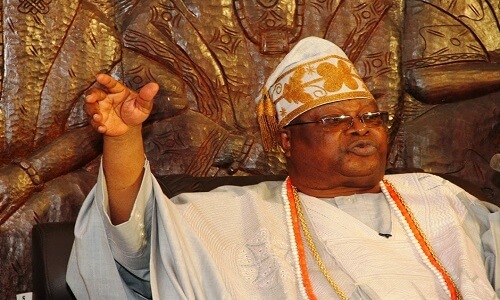He also regretted that the political class, over the years, had not accorded the traditional rulers their rightful place in governance.
Oba Adetona made the comments in Ijebu-Ode, Ogun State, in his address at the second Annual Professorial Chair Lecture delivered by Professor Ayodele Olukotun.
Olukotun, the holder of the Professorial Chair in Governance in the Department of Political Science of the Olabisi Onabanjo University, Ago-Iwoye, spoke on ‘Civil Society & Governance in Nigeria’s Evolving Democracy 1999-2018’.
The Awujale noted that prior to the time Africans started governing themselves, the traditional rulers were in charge, and even colonial rulers recognised and consulted them.
“The country was very peaceful (though) not as developed as this,” he said, but that on the contrary, since the politicians took over, traditional rulers had been largely relegated to the background.
“Obas are in charge of governance and welfare of their people; and I think that government, before they do anything, should consult with them (obas).”
On the spate of killings in the country, the Awujale appealed to the federal government to massively invest in security.
“If the revenue of Nigeria could be extended to the security of lives and property of the people – which of course is the primary function of the government – I don’t mind.
“If you build hospitals, construct roads and do all sorts of things, and lives are not secure, who will use them?” He asked rhetorically, adding that the realization that there is a need for change made him decide to endow the professorial chair in governance at OOU.
“It is my hope that the professor would do his job and that government would listen and pick quite a few things of what they’re saying,” he said.
In his lecture, Professor Olukotun noted that while it cannot be said to be completely dead, civil society in Nigeria is currently “in a state of stupor, and requires reawakening.”
While highlighting the roles played by civil society in the past and its impact on governance, he regretted that today, civil society has largely lost its bite.
“Yet, if there was a time when civil society should come into its own to ameliorate the crisis of governance, it must be now,” he noted.
”In other words, while some civil society organisations such as the Electoral Reform Network, Budgit, the CLEEN Foundation, Socio Economic Rights and Accountability have been able to bring about marginal advances in policy reforms or in budget monitoring, much of these activities are limited and confined to a few NGOs.”
While also identifying limited capacity, funding and resource profile as some of the problems inhibiting vibrant civil society activism, the Professor of Political Science canvassed a sort of coalition of civil society organizations and pooling of resources towards making ‘national impact’.
The chairman at the event, Professor Anthony Asiwaju, in his comments had earlier spoken on the need for notable religious leaders and groups in the country to lend their voices to issues of civil governance in Nigeria.
Governor Ibikunle Amosun of Ogun State, who was represented by his deputy, Mrs Yetunde Onanuga, noted that the chair had helped in the entrenchment of democracy.
He however urged well-meaning individuals and corporate organizations to take a cue from the Awujale in deepening democracy and governance in the country.
Amosun said that his administration, on its part, would continue to place education on the front burner.
He then congratulated Oba Adetona on his birthday, which the lecture is usually scheduled to commemorate.
Dignitaries at the event included the chairman of the Alake of Egbaland, Oba Aremu Gbadebo; Oba of Lagos, Oba Rilwan Akiolu; Alaafin of Oyo, Oba Lamidi Adeyemi; Olu of Ilaro (Paramount ruler of Yewaland); vice chancellor of the Olabisi Onabanjo University, Ago-Iwoye, Professor Ganiyu Olatunji; chairman of the African Newspapers of Nigeria Plc, Ambassador (Dr.) Tokunbo Awolowo Dosumu; elder statesman, Chief Ayo Adebanjo; former governor of Ogun State, Chief Olusegun Osoba; Olorogun Sunny Kuku; Chief Subomi Balogun, and Chief Bolaji Ayorinde (SAN), among others.
Chief Mike Adenuga, who was represented by Mr Folu Adeola, donated N20 million in support of the initiative.






